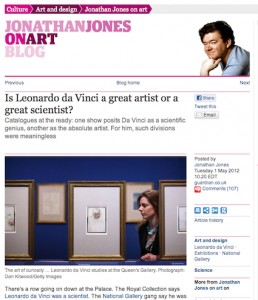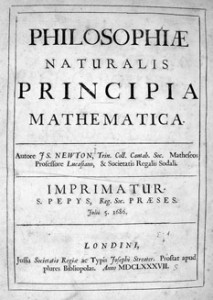
Two current shows on Leonardo da Vinci have prompted the perennial speculation about his status as an artist or a scientist. Jonathan Jones wants Leonardo to be “a scientist and an artist at the same time.” Thony over at The Renaissance Mathematicus takes Jones to task for making a category error, pointing out that for Leonardo the categories artist and scientist didn’t exist. Thony then defended his position: to apply either artist or scientist as we normally use those terms to Leonardo is incorrect, anachronistic, and ahistorical. Thony explains how the “occupational categories” of artist and of scientist didn’t exist. He offers, instead, the artist-engineer (see his book review for how this term applies to Galileo). Thony’s posts raise important historiographic questions: What is science and how do we identify science in the past?
The identity of science and the authority it enjoys in our modern world often inform how we categorize past activities. In a sophisticated version of Collingwood’s scissors-and-paste history: when something looks like science to us we assume it is and was science. Here the historian in the present decides what was science in the past and then goes off in search of it. The historian then compiles a story to support those decisions. The historian determines both the appropriate questions or topics and the legitmate answers or accounts. Such an approach seems to work fine, giving us histories populated with names like Copernicus, Vesalius, Kepler, Harvey, Galileo, Descartes, Boyle, Newton, etc.
But such an approach too readily equates science with a thing and reduces the people who might have been doing science to shorthand references in the timeline of science. Our developmental stories about science trace its progression from some benighted past to an increasingly enlighted present. Such an approach encourages us to ask: Who got it right and who got it wrong? Copernicus and his heliocentric astronomy superseded medieval astrology. Boyle’s chemistry replaced earlier alchemical practices. Bacon’s New Science with its use of experiment replaced an outmoded Aristotelianism with its reliance on book learning. And of course Newton. While the range of acceptable topics and questions has expanded (see Pamela Smith’s recent review “Science on the Move: Recent Trends in the History of Early Modern Science,” Renaissance Quarterly 62 (2009): 345–75), much historiography remains progressive, especially outside the rather narrow confines of history of science.
Science isn’t and never was a thing lying around to be discovered. Science is and always has been a human activity. Althouh the products of science—laws of nature, facts, statements about the world out there—look like they have some existence beyond the humans who articulate them, in the end even they are the products of human activity and have meaning only insofar as other humans give them meaning. Our histories, thus, have to be about people engaged in this activity. We should ask questions about how and why they engaged in that activity, how and why they modified their pursuit of that activity, and how pursuing that activity informed and was informed by the other activities they pursued.
Thinking of science as a human activity shifts our focus from the products of science to the humans doing science. We can’t simply evaluate statements about the world out there and laws about it. The value we place on what people in the past produced bears no necessary relation to what those people thought they were doing or how they valued their products. We need to ask instead about what people were doing and why were they doing it otherwise we risk misunderstanding the products of their activity.
Science seems to be a special type of activity, an intentional activity. We cannot accidentally do science any more than we can accidentally go for a walk or play a game. Games are paradigmatic intentional activities. Playing a game calls forth and give coherence to the family of actions involved in playing that game. A person can’t play a game without being aware of playing that game, even if the person doesn’t know the name of the game or calls it something unusual. Games are discrete: a person cannot with the same set of actions simultaneously play different games. Games seem to share the following characteristics:
- Games are structured activities;
- Each game has a goal or point, rules, and procedures and conventions;
- A person is or is not playing a game and knows it;
- The identity of a game is independent of the people playing the game and the skill level of the players;
- Games don’t exist until they have been created;
- Games have histories and often evolve from one particular activity into another;
- Skilled players are the best experts on the identity and rules of the game.
This list illustrates, I hope, the ways that games and science are similar activities. This list also has important consequences for how we study the history of science (For a fuller treatment of science as a game, see A. Cunningham, “Getting the Game Rigth: Some Plain Words on the Identity and Invention of Science” Studies in History and Philosophy of Science, 19 (1988): 365–388).
Most importantly, it cautions us against imposing our idea of science on the actions of people in the past, regardless of how familiar their actions may appear. Instead, we need to start from the description people in the past used or would have used to explain their activity. They are the experts in the game they were playing. We must begin with the actors’ categories in our effort to reconstruct what they were doing. Rather than assume that somebody was doing science when that person was investigating nature, we need to ask: What was that person doing when investigating nature? What was that intentional activity? What were the rules and conventions that structured it? What were its goals? Why did the person choose to engage in that particular activity?

If we take such questions seriously we will have a hard time finding anybody before the nineteenth century doing science as we understand that activity. As Thony pointed out in his posts, there is more at issue here than simply the coining of a term—there was no such thing as a scientist avant la lettre because there was no such thing as science. No matter how often Newton has been labeled a scientist, as Thony again usefully points out, Newton was principally concerned with God. And no matter how often Newton’s Philosophiae naturalis principia mathematica has been described as a scientific text,it was, as the fuller title of his book indicates, a work of natural philosophy, an enterprise that took as one of its main goals understanding God. Nature was the object of investigation but not the goal. For a fuller discussion of Newton’s Principia, see A. Cunningham, “How the Principia Got Its Name: Or, Taking Natural Philosophy Seriously” History of Science 29 (1991): 377–392 (available online here). Science means something to us becasue it describes a particular game along with all the rules and conventions and goals associated with that game.
Collingwood warned us against treating terms as ahistorical entities and going off in search of them. The difficulty with such ideal concepts is, as Ludwig Wittgenstein remarked, they become “like a pair of glasses on our nose through which we see whatever we look at. It never occurs to us to take them off” (this is proposition 103 from Wittgenstein’s Philosophical Investigations). Looking for science in the past ensures that we will find it. But in finding science, we do violence to that past by distorting it to fit our prejudices.
[Reposted at PACHS.]
3 replies on “Science is Not Just a Word”
Darin says:–
Games are discrete: a person cannot with the same set of actions simultaneously play different games.
David says:–
Game of (fill in the blank — Scrabble, poker, pool, etc.)
Game of demonstrating superiority over rival or enemy X
Game of courting the attention of attractive person Y
One game with formal rules, two with flexible rules but intended outcome, few or no additional actions required.
If it is known or guessed that the two informal games are being played, all acts or words in the formal game can also be part of the other games, without needing any added tones of voice or superfluous action.
Performance can be performative, within several games at once.
In terms more specific to hist.sci., one could (or still can, in some contexts) be playing knowledge-making, personal rivalry or status, politics, religion, and national rivalry or status, all at once. Without remainder.
Leibniz Newton might be seen as including several of these.
<>
Is anything? We always have to make the categories, unless it’s damn similar to something we already know — a distant galaxy, a new species of grasshopper. Even then we have to work out how the new thing fits into our current classificatory system.
For some kinds of thing, we’ve had the category for so long that we suppose it to be a natural kind, but even natural kinds had to be invented once upon a time.
Linnaeus and the invention of mammals.